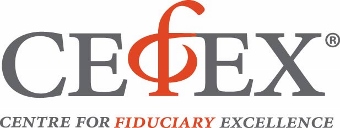If you’re looking for Australia’s best financial planner, you’re at the right place. What makes us worthy of your trust? Let’s turn to the Wall Street Journal‘s list of questions to ask your financial advisor.
The very first question they suggest you ask:
1. Are you always a fiduciary, and will you state that in writing?
Yes, we are a fiduciary financial advisor. We are certified by CEFEX and audited on an annual basis. This is a rarity in Australia, Mancell Financial Group are one of only six fiduciaries certified by CEFEX in Australia.

We believe everything stems from our status as a fiduciary. It is the overriding factor that makes every other question in the list redundant – it is the signifier that we place your financial interests first.
To be certified as a fiduciary our investment process had to be scrutinized and our firm has to have an adherence to the following:
Know standards, laws and trust provisions.
Whether an ERISA plan, an endowment or foundation, a private trust, or an individual investor, all of the parties involved in the investment process must work in coordination with each other and have a clear understanding of where their individual roles and responsibilities begin and end. Documentation ensures continuity of the investment strategy when there is a change to any of the parties, prevents misunderstandings between them, and avoids omission of critical fiduciary functions.
Diversify assets to specific risk/return profile of the client.
The scope of an Investment Advisor’s engagement often includes the responsibility to choose an appropriate combination of asset classes to optimize the client’s portfolio. This involves structuring the portfolio to achieve maximum portfolio returns consistent with the client’s investment objectives, risk tolerance and time horizon. The Investment Advisor’s choice of asset classes and subsequent allocation typically will have more impact on the long term performance of the client’s investment strategy than the selection of money managers.
Prepare investment policy statement.
The preparation and maintenance of each client’s IPS is one of the most critical functions performed by the Investment Advisor. The IPS should be viewed as the business plan for managing an investment portfolio.
The IPS should be a formal, long-range strategic plan that allows the Investment Advisor to coordinate the management of each client’s investment program in a logical and consistent framework. All material facts, assumptions, and opinions should be included.
Prudently select fiduciary and non-fiduciary service providers and document due diligence.
Investment Advisors will be held to an “expert standard of care” and their activities and conduct will be measured accordingly.
It is important for the Investment Advisor to be familiar with the universe of investment options (i.e., mutual funds, exchange-traded products, separately managed accounts and alternative investments), prudently select them, and document the process, for no one implementation structure is right for all occasions.
Control and account for investment expenses and other costs.
The Investment Advisor has a duty to control and account for all dollars spent for investment management services. If the Advisor uses funds or managers with higher than average fees, then the rationale for paying up must be documented.
Avoid or manage conflicts of interest in favor of the client.
The fundamental duty of the Investment Advisor is to act solely in the best interest of another party, such as a financial planning client, retirement plan participant, or trust beneficiary. In addition, the Advisor has a responsibility to employ an objective due diligence process at all times.
Monitor service providers and prudently manage service provider relationships.
The Investment Advisor’s monitoring function extends beyond a strict examination of performance. By definition, monitoring occurs across all policy and procedural issues previously addressed on this page. The ongoing review, analysis, and monitoring of relevant decision-makers and/or money managers are just as important as the due diligence implemented during the service provider selection process.
Monitor and ensure conformity to fiduciary obligations owed to clients and beneficiaries.
This is where the fiduciary duty of care takes on special meaning with respect to assessing the advisor’s overall effectiveness in meeting his or her fiduciary obligations. Planned fiduciary assessments conducted at regular intervals provide for this needed review. The CEFEX certified Advisor effectively addresses this precept by undertaking independent annual assessments based on a standard of fiduciary best practices.
To ensure we continually comply with our fiduciary obligations we are independently audited on an annual basis on all of these standards. A tiny number of Australia’s financial advisors have a fiduciary certification. Does that make us the best financial planner in Australia, well here are a few more reasons.
This represents general information only. Before making any financial or investment decisions, we recommend you consult a financial planner to take into account your personal investment objectives, financial situation and individual needs.




